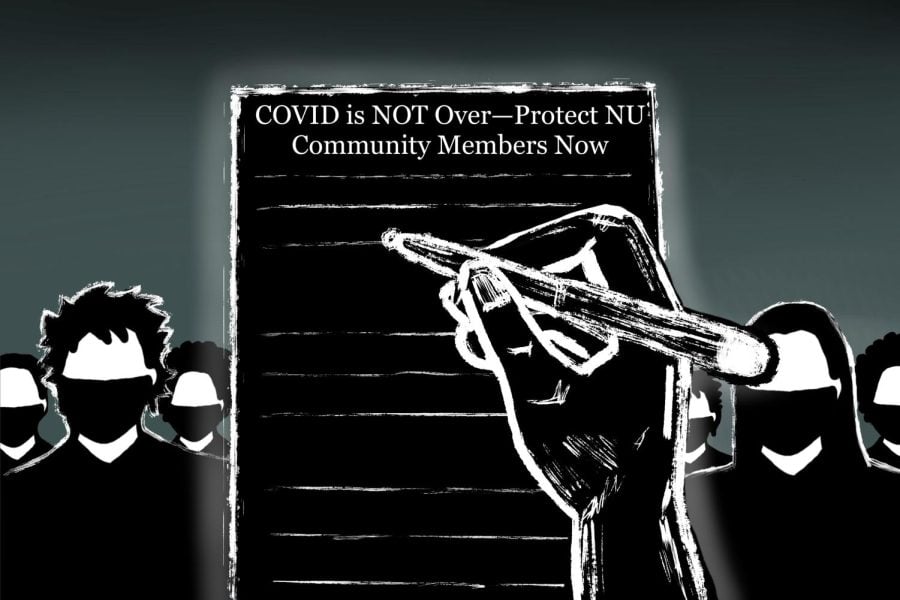‘It’s never too late to help protect our communities’: NU community raises concerns about rollback of COVID-19 mitigation strategies
Students have written a petition in response to the University’s rollback of COVID-19 mitigation strategies, which has since garnered more than 90 signatures.
May 18, 2023
In April, Northwestern announced it will discontinue certain existing COVID-19 mitigation strategies for the next academic year, including isolation housing in 1835 Hinman, on-campus testing in the Donald P. Jacobs Center and the current COVID-19 vaccine requirement for most students.
But some students have expressed concerns about how the changes will impact those who are at high risk for COVID-19. On May 1, a group of graduate students authored an open letter to the NU administration listing 10 demands concerning the University’s rollback of protections, including the reinstatement of a vaccine requirement and public COVID-19 dashboard, among other items. The letter has since garnered more than 90 signatures from NU community members.
Fifth-year Ph.D. candidate Emma Kennedy helped write the petition, alongside others in the NU Graduate Workers union. According to Kennedy, the group had been having informal conversations to take action since early April. But after NU officially announced the rollback, the group decided to ramp up their efforts and start writing, she said.
“The University has a responsibility to protect its students, staff, graduate workers, faculty and any community member,” Kennedy said. “Having this petition circulate shows the Northwestern administration that there are people who still really care about this.”
In an email to The Daily, University spokesperson Erin Karter said NU’s response to COVID-19 has “always been guided by state and federal guidance.”
Nobody should get sick while doing their job regardless of their occupation, Kennedy said. As a graduate worker, Kennedy said, she was one of the two people wearing a mask in her classroom, which made her feel uncomfortable.
“Being a graduate student, and a graduate worker specifically, you end up in a tight spot when you’re trying to be conscious of public health,” Kennedy said. “There’s an expectation that we have to be in person, but it doesn’t always feel safe to do so.”
Art history Prof. Rebecca Zorach said they signed the petition to support graduate workers, but also because of public health concerns at large.
“There’s a big push to return to normal, but we’re not living with normal conditions,” Zorach said. “It feels important to me for the community to take care of the people within it who are the most vulnerable.”
Zorach found it empowering to see community members from different academic departments sign the letter. She added she prefers a more cautious approach to lifting the mitigations than the administration’s current strategy.
In the petition, anonymous testimonials describe difficulties in navigating campus life without COVID-19 guidelines. One person wrote that professors have abandoned practices that made learning accessible, such as recording lectures and posting slides after class.
“Disabled and/or chronically ill students, myself included, are losing resources that would have continued to benefit us,” one person wrote. “People still have disabilities, and AccessibleNU continues to be limited in its ability to address students’ needs.”
Karter said in the email that NU continues to provide “reasonable accommodations” to students, staff, and faculty with disabilities who have an approved accommodation through AccessibleNU or the Office of Civil Rights and Title IX Compliance.
Medill Prof. Steven Thrasher, who signed the petition, studies the intersections between racism, homophobia, policing, medicine, incarceration, culture and health. He also looks at how viruses spread and reveal inequalities.
Thrasher said low-wage staff members and people who work in janitorial services are most affected by the pandemic. Unlike a professor or student, he said, they can’t do their job remotely.
“We have a bigger medical and ethical obligation to go beyond what the government’s dictating right now with the public health emergency,” Thrasher said. “There are very few resources now for people.”
Weinberg sophomore and petition signee Skyler Stone said resources like masks and COVID-19 tests should be readily available. The petition requests the University provide free masks at each building entrance and distribute at-home tests, free of charge.
Purchasing these items is a financial burden, she said.
“As a first-generation, low-income student, masks are the last thing on my priority list in terms of what I spend my money on,” Stone said. “(Masks) are so expensive nowadays, and they’re so necessary for a lot of circumstances.”
Kennedy hopes the petition will raise awareness of the ongoing existence of the pandemic, while also providing an avenue for students to make change. The petition can help students understand they are not alone in their concerns, she said.
At the start of the pandemic, Zorach said, there were broad discussions about mutual aid to support the community during a difficult time. But with the emergence of the vaccine and other mitigation tools, Zorach senses those conversations have been “swept under the rug.”
The petition asks the community to think deeper about this “forgotten” conversation, they said.
Like Zorach, Kennedy emphasized the importance of community care during the pandemic.
“We take care of each other at this point,” Kennedy said. “You can always change. Nothing is set in stone. It’s never too late to help protect our communities.”
Email: jessicama2025@u.northwestern.edu
Twitter: @JessicaMa2025
Related Stories:
— Northwestern students and faculty have mixed responses to University pandemic reopening plans
— The Daily Explains: Navigating COVID-19, monkeypox and the flu this season


